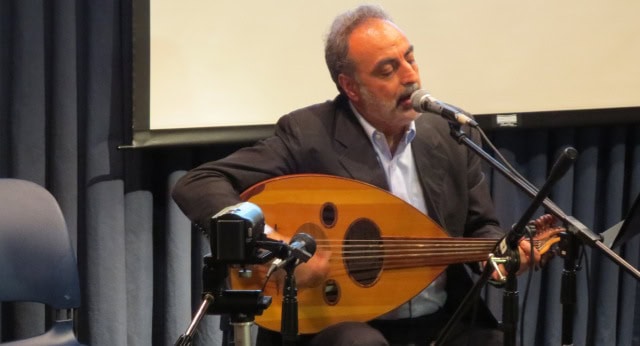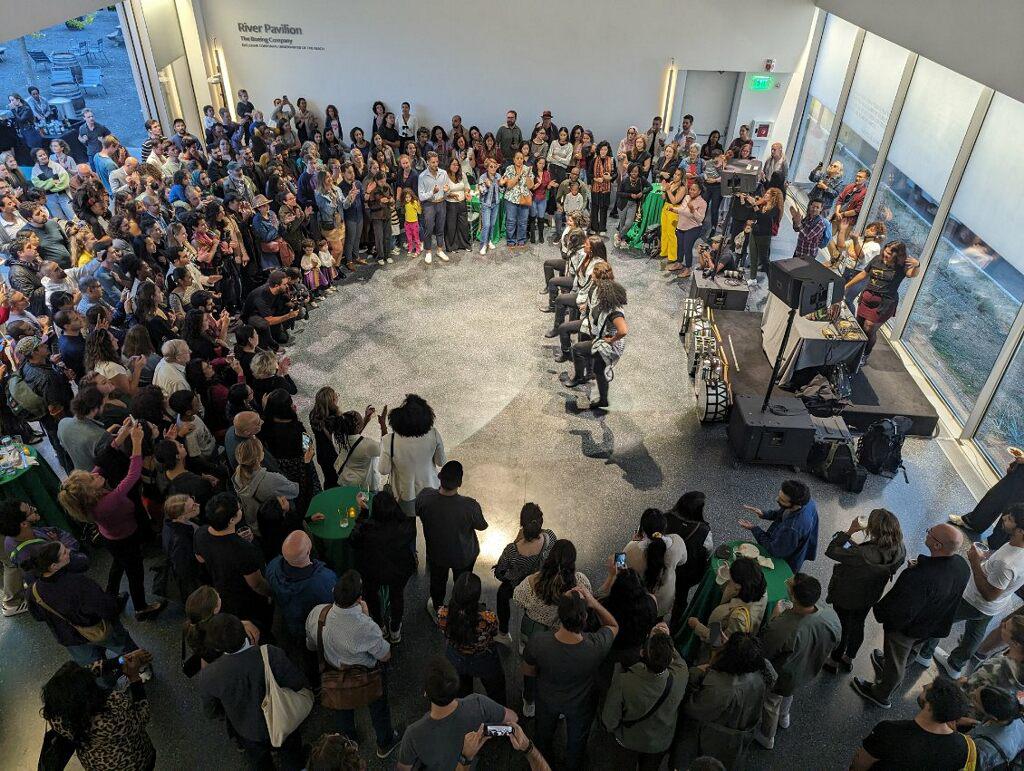February 20 8:00 pm
Sowt al Ard (The Sound of the Earth) is a multidisciplinary performance that weaves together opera, Arabic instrumentation, Levantine dabke, projections, and sensory immersion to explore ancestral memory, identity, grief, and interconnection. The project functions as a living, breathing ritual of remembrance and resistance, asking: What stories does the earth carry, and how do we listen?
The performance is structured as a journey through the ways humans experience the earth through their senses. Each element highlights a different dimension, sound, smell, touch, memory, and voice, inviting audiences into an immersive encounter with culture, history, and ritual.
At the beginning, dancers move among the audience carrying traditional incense (dispersed through the theatre using essential oils instead of traditional incense), a fragrant resin that evokes memory. Center stage, an instrumentalist plays the oud, enveloped by the aroma, while a vocal improvisation celebrates the beauty of the Levant. Music and scent intertwine, connecting personal and cultural memory. The improvisation is interrupted by an operatic voice representing the earth, accompanied by projected images of homeland, migration, and displacement. Adapted lyrics in Arabic and Italian confront erasure, diaspora, and inherited trauma while offering moments of healing and reclamation.
This operatic piece is interrupted by an older woman’s chant traditionally sung by women of the Levant, mourning loss of home. The dancers dressed in traditional falaheen (workers of the land) dresses, come on stage and start reciting the aweeha, an Arabic call used by women in Palestinian folk traditions to express celebration in poetic form. The vocal invocation anchors the work in the voice of women as keepers of cultural memory. The music gradually transforms into a celebratory folkloric dance, signaling resilience, connection and the interweaving of sorrow and joy. Projected images show water turning dirt into mud, leaving footprints alongside maternal imprints. The ritual concludes with the planting of seeds, symbolizing growth, memory, and continuity.
Throughout, vocal and instrumental elements shift to convey grief, loss, and the universal experience of mourning. Traditional lamentation rituals are performed, followed by improvisatory instrumentation and vocal ornamentations, echoing cultural memory and ancestral voices. Images of olive trees and the land’s natural beauty are projected as the performance transitions to celebration, with call-and-response vocal traditions and lively folkloric dance. Low-frequency bass drums called tabls are incorporated, producing vibrations that are both felt and heard, connecting the body to the earth and the soundscape.
The performance culminates in a return to collective traditions, recalling the origins of dabke as a communal ritual of work, celebration, and shared music. The final musical sequence blends operatic and folkloric elements, closing the journey in song and movement that honors continuity, resilience, and connection.
Sowt al Ard is rooted in the belief that sound holds power beyond language, it heals, provokes, and reconnects us to what has been lost or silenced. By integrating Arab aesthetics, storytelling, and ritual into the operatic form, the work challenges Western classical conventions and centers Arab and SWANA histories and sonic landscapes.
Ultimately, audiences leave, awakened to the power of voice, sound, and memory. They feel the vibration of resistance, the tenderness of grief, and the earth singing back their own stories.
Runtime: 1 hour
Ages: All Ages
Content Advisory: Mild usage of flashing lights and loud sound effects. Regularly occurring references to grief and violence.
Classical Screamer, Fairouz Foty is a Palestinian-Egyptian American opera singer whose voice of resistance breaks glass ceilings and echoes across revolutionary hearts. A DC native, Fairouz Foty began her classical opera training at 13 with the Washington Opera Institute, later excelling as a P.O.S.S.E scholar at Lafayette College and earning a Master’s in Vocal Performance from Westminster Choir College, while achieving recognition as a finalist in prestigious opera competitions.
Fairouz Foty has performed internationally and at prestigious venues like The Kennedy Center and Strathmore Hall, earning acclaim for roles such as Leonora in Il Trovatore, Violetta in La Traviata, and Lauretta in Gianni Schicchi, with performances in countries including Egypt, Togo, Cuba, and Syria.
In 2023, she shifted from traditional classical expression and was featured by Stephanie Mercedes as the lead soprano for Cultural DC’s three-part series “Never in Our Image” – an experimental queer gun-destruction opera and then again as an artistic collaborator for “We Shall Not Inherit the Earth” – an anti-surveillance opera sponsored by Georgetown Law.
Fairouz co-founded Quartertonez Music school in Chevy Chase, DC to pioneer and advocate for quality music education that interrogates the artistic standard of traditional western classical music and embraces more equitable perspectives and teaching methods instead. She is a 2021 and 2024 Fellowship recipient of the DC Commission on the Arts and Humanities.
Fairouz Foty is a multifaceted artist—a cellist, community educator, and Dabke dancer—who co-founded the first all-womens dabke troupe in the DMV area in 2023 Malikat al Dabke, using folkloric dance to celebrate Arab/SWANA culture and resist cultural erasure.
You can follow her at @classicalscreamer | fairouzfoty.com
Malikat Al Dabke (Queens of Dabke) is the first all-women’s dabke troupe in the DC, Maryland and Virginia (DMV) area, specializing in performing and teaching Palestinian, Lebanese and Iraqi dabke/chobi, and zaffe.
Fairouz Foty, co-founder of Quartertonez Music School, was inspired to create a space through dabke for women based on a mutual love for dance and Arab/SWANA culture to spread its joy across generations. This space naturally developed into a collaborative, professional dance troupe, starting in January 2023, and is made up of dedicated Arab American women who work every day to preserve their identities through dabke and resist erasure and appropriation.
Each member of the group has over a decade of Dabke experience performing and teaching hundreds of students through volunteer and educational workshops. They have performed across the country (including DC, Maryland, Virginia, Georgia, New York, Pennsylvania, Kansas and Michigan), Some notable events that Malikat Al Dabke has performed in include The Kennedy Center, South African Embassy, Nicaraguan Embassy, Laylit, ADC, Interfusion Festival, The Black Cat, New York Arab Festival, PBS, Arab America among many others.
Fuad Foty aka Amo Fuad, is a master oud instrumentalist and vibrant vocalist with over thirty years of performance and teaching experience. Raised on classical Arabic music, he developed a deep passion for the oud, later touring nationwide with various Arab bands and sharing his love for his culture. Along the way, he met his wife, Egyptian-American artist Mona El-Bayoumi, and together they nurtured a family grounded in music and art. Fuad taught his five children Arabic music, inspiring them to create a unique fusion blending traditional Arabic songs with opera, rap, jazz, and more. He now performs, sings, and lectures across the United States and teaches oud and Arabic vocals privately through Quartertonez Music, which he co-founded.



